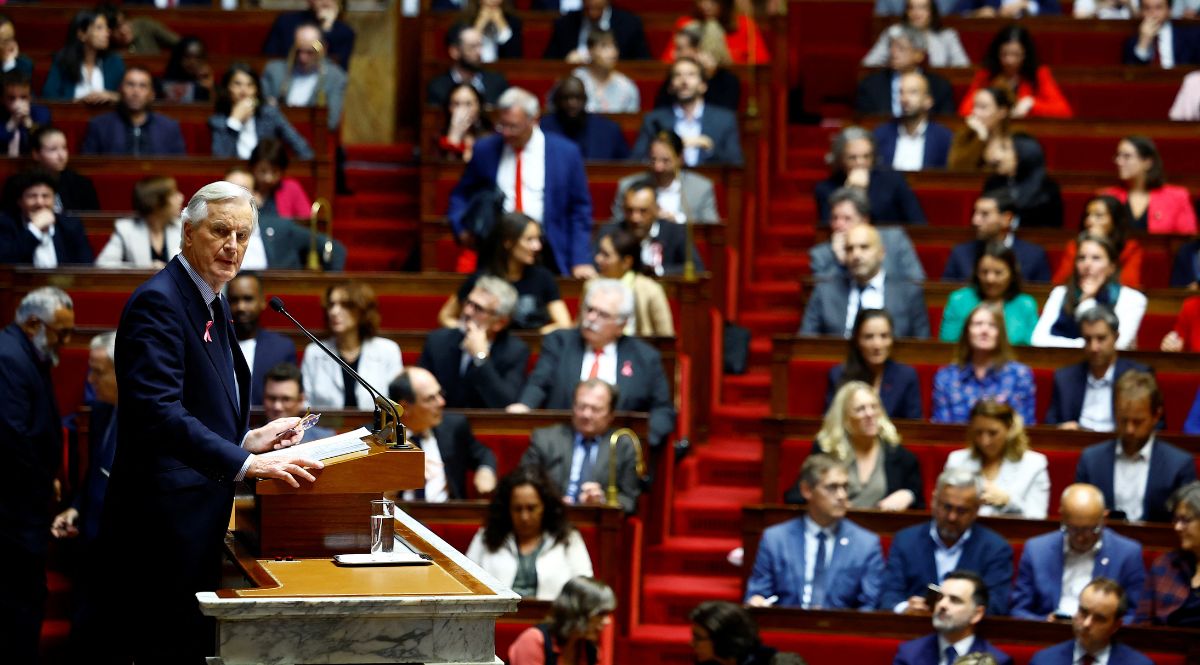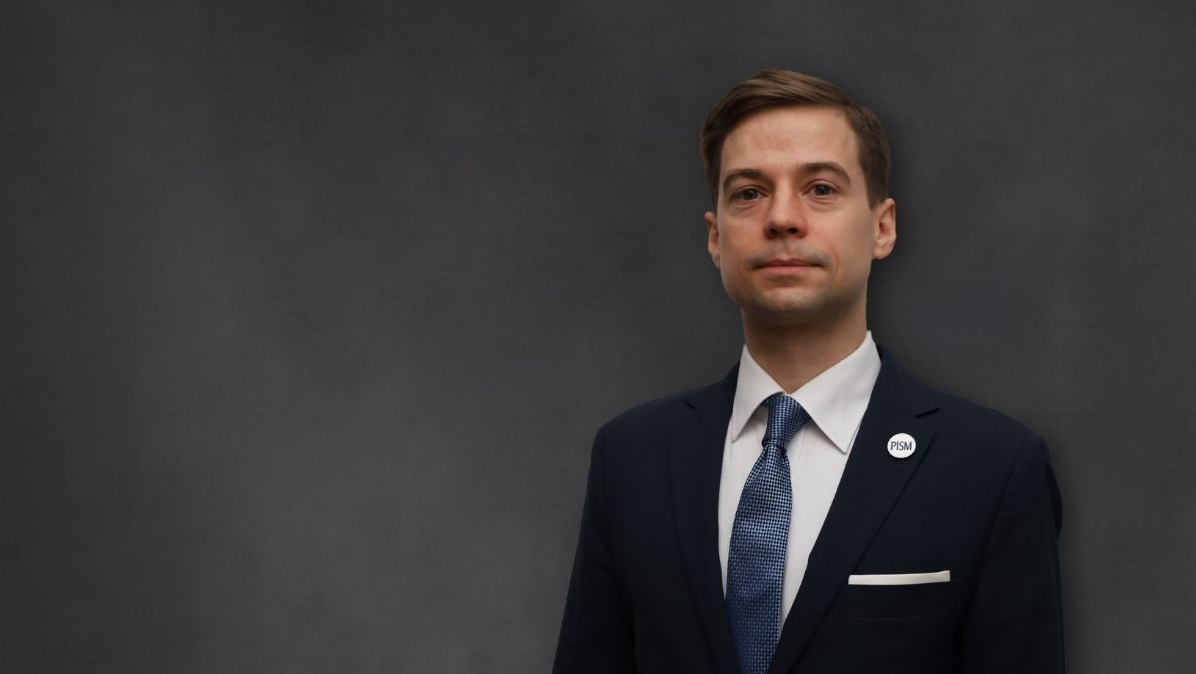Barnier Government Proposes to Continue Previous Political Course with a Right-Wing Correction
Two months into the new French government, its main lines of action (state of public finances, immigration, and pension reform) are crystallising, as are the policy challenges facing Prime Minister Michel Barnier. The announcements of measures and the composition of the cabinet largely point to a continuation of existing domestic and foreign policies. The government’s survival will be determined primarily by its ability to forge a domestic policy compromise with the parties supporting it, as well as the favour of the far right.
 Sarah Meyssonnier / Reuters / Forum
Sarah Meyssonnier / Reuters / Forum
Following the snap elections of 7 July won by the left, the political crisis in France deepened. The outcome of the vote has made it impossible to form even an informal majority capable of at least partially pursuing the programme of the ruling camp while limiting the risk of dismissing the government—as was the case in the previous legislature (a minority government made up of centrist parties was then able to function thanks to informal support from the Republican party). President Macron’s decision to dissolve the AN immediately after the European Parliament elections in June, in which the ruling camp was defeated, and to call new elections, weakened France’s activity on the European stage, as the attention of the political class focused on domestic issues. The election of Barnier as head of government was supposed to break the political deadlock, but the differences in the programmes of the parties that make up the cabinet make it difficult to implement the prime minister’s announcements.
Cabinet Composition
The minority government is mainly made up of the centre parties (the presidential Renaissance, together with its current coalition partners, the MoDem and Horizons parties) and the right-wing Republicans (LR), to which Barnier belongs. All these groups won fewer seats than in previous elections and currently have the support of around 220-230 MPs in the 577-seat Assembly, weakening the government’s legitimacy. However, a possible dismissal as a result of a no-confidence vote would require cooperation between the left and the far-right National Unity (RN), which has so far expressed no desire to do so, seeing such an attitude as an opportunity to exert pressure on the government’s actions and implement its demands.
The composition of the government and the distribution of posts suggest political continuity from the 2022 elections onwards, with an even greater strengthening of the right-wing. This is particularly evident in the Ministry of the Interior, headed by former LR senator Bruno Retailleau, a proponent of strengthening security and tightening immigration laws. An attempt to counterbalance Retailleau’s actions may be the appointment of Didier Migaud, a former socialist politician and the only representative of the left in government, as minister of Justice. With the revision of the law on internal security and immigration policy, cooperation between the two ministries will be essential. Barnier himself is more balanced on immigration and is trying to tone down Retailleau’s radical proposals. Most of the centrist ministers are also former LR members (Sébastien Lecornu, Rachida Dati, Catherine Vautrin, and Benjamin Haddad). The Barnier government is distinguished by the appointment of a minister responsible for the budget and public accounts under the prime minister after separating this area from the Ministry of Economy and Finance to improve inter-ministerial discussions on the budget. At the same time, there will be a minister Delegated for European Affairs attached to the prime minister and minister for Europe and Foreign Affairs, which may suggest Barnier’s (a former EU Commissioner) desire to retain influence over EU affairs. Also new is the appointment, attached to the prime minister, of a minister in charge of the overseas territories, something that previously fell within the remit of the minister of the Interior, and which has to do with the difficult situation of such territories, especially those struggling with the social and economic crises in New Caledonia and Martinique.
Internal Policy Priorities
Barnier, in outlining the government’s key policy directions at AN, drew attention primarily to security, including the need for a tougher stance on irregular immigration. The interior minister announced the introduction of two laws regulating migration issues. The first will implement the norms of the EU Pact on Migration and Asylum, the second is to tighten immigration law by, among other things, introducing the provisions of the Immigration Control Act passed by the previous government, which were repealed by the Constitutional Council (for formal reasons). These are to, among other things, introduce migration quotas and tighten the family reunification procedure. However, Barnier ruled out the possibility of sending migrants back to third countries (as Italy has tried to do in an agreement with Albania).
A key domestic policy issue will be the 2025 budget. France is the third most-indebted country in the EU (after Greece and Italy; at the end of the second quarter of 2024, France’s public debt was 112% of GDP and the deficit could exceed 6% of GDP this year) and was placed under the excessive deficit procedure by the European Commission in June this year. The draft budget includes both spending cuts (of around €41 billion) and a proposal to raise taxes. The government wants to reduce the deficit to 5% of GDP in 2025 and 3% in 2029. The cuts include the later indexation of pensions, the abolition of selected reductions in employer contributions and a reduction in financial aid for financing vocational training. The tax increase, on the other hand, is expected to primarily affect large companies and better-off individuals. These proposals have been criticised by some of the parties supporting the Barnier government—Gabriel Attal, who chairs the Renaissance, has opted for less tax increases and more austerity. The lack of broad political support for the budget could force the government to adopt it without a vote (under Article 49(3) of the constitution), weakening the legitimacy of the government’s actions and exposing it to a motion of censure.
Main Foreign Policy Orientations
Barnier does not see European policy and defence as a “reserved domain” of the president (as a result of political practice in France, this is how foreign and defence policy is understood), but as a shared competence between the government and the president. However, he pointed out key aspects of the government’s actions in these areas, which largely coincide with Macron’s vision. He emphasises the need to preserve France’s strong role in Europe, stressing the importance of industrial policy, technological sovereignty, economic security, defence, and the fight against unfair competition from third countries. He intends to revise national regulations that are more restrictive than EU requirements and weaken French businesses and farms. He has also announced the possibility of postponing the implementation of selected European standards which, in his view, could adversely affect the competitiveness of the French economy (this would, however, be contrary to EU law). Barnier declares his intention to protect the interests of French agriculture during EU budget and free trade agreement negotiations.
The government will seek new European investments in the climate transformation, innovation and research, the digital, health, space, and defence sectors, and nuclear energy, particularly through European industrial policy instruments. Barnier also stated the need to strengthen Frontex’s powers as the EU’s border guard. The new government announces a review of bilateral agreements on migration. Retailleau has proposed a reduction in development aid to third countries in the absence of cooperation on readmission, and even an increase in tariffs or a reduction in the number of visas issued.
The Barnier government also announced continued support for Ukraine and continued French activity in the Middle East, seeking a suspension of the hostilities in Gaza and Lebanon as soon as possible, increasing humanitarian aid, promoting a two-state solution, and maintaining political support for Lebanon.
Conclusions and Outlook
France has, since Macron’s first term in office, put forward ambitious plans for EU reform, which have been actively supported by a prime minister and government drawn from his camp and de facto subordinate to him. The appointment of Barnier’s cabinet puts an end to such an arrangement and changes the power dynamics in the executive (the prime minister becomes a relatively independent centre of power), implying a weakening of French influence on European policy. Unprecedented influence on French politics has been gained by the RN, which, although it does not take responsibility for governing, can obtain concessions from the government by threatening to join the left, which wants the government dismissed.
The Barnier government’s priorities in the area of domestic politics indicate a continuation of the trend of the French political scene shifting to the right—the leaders of liberal and right-wing political groups, seeing the RN’s successes, are trying to take over the party’s electorate using its programme demands. For Poland, it is beneficial to maintain the pro-European course of the French government, which enables both the strengthening of bilateral relations and further support for Ukraine. Following Donald Trump’s victory in the United States, Barnier will also push for a more coordinated European strategy to strengthen defence capabilities and increase the EU’s resilience in areas such as trade, agriculture, and the climate transformation.




.png)
(1).jpg)
